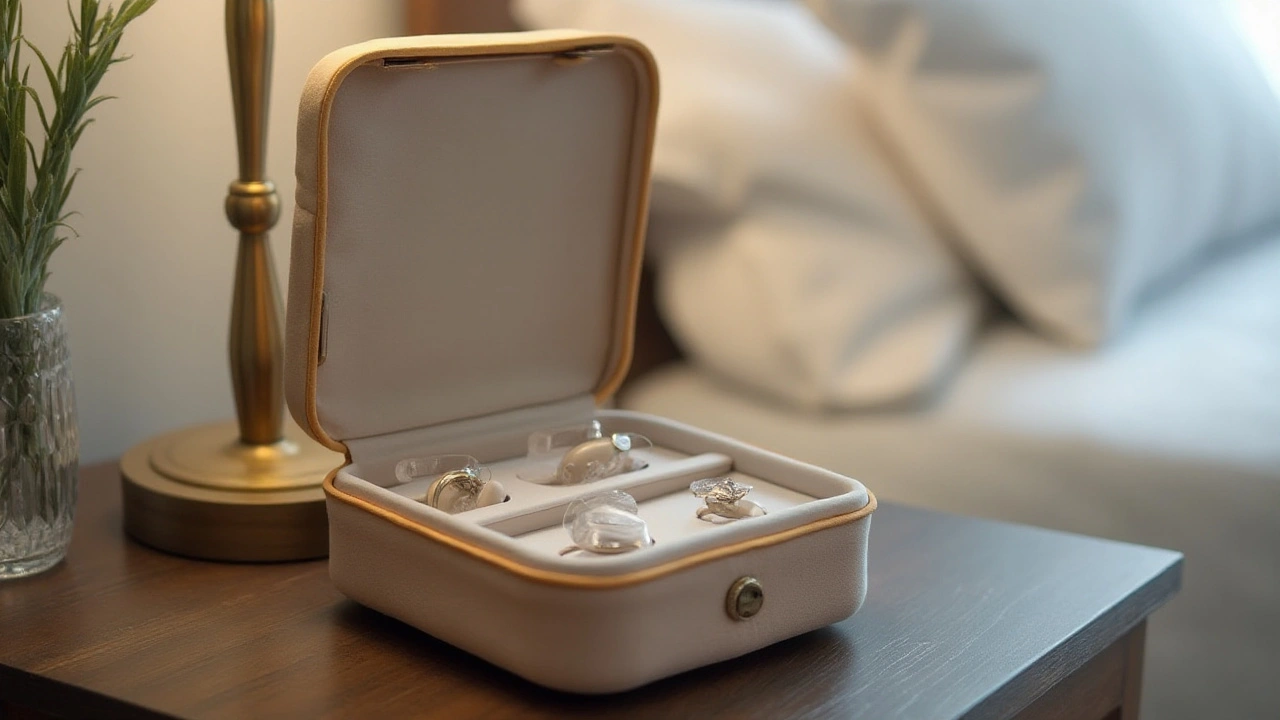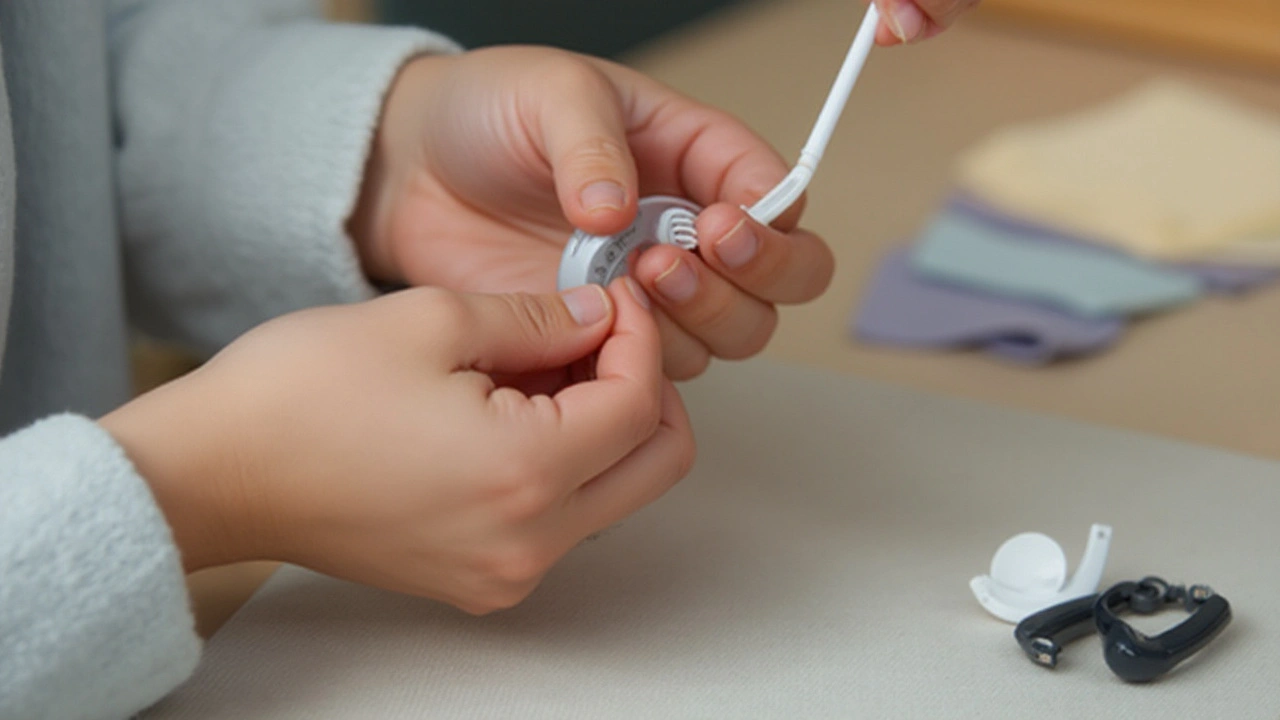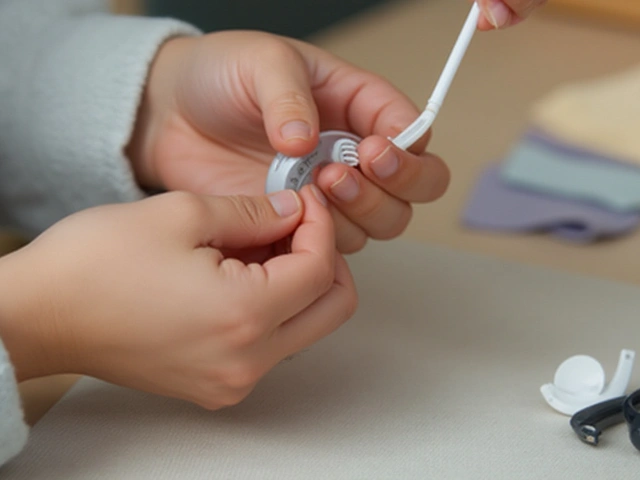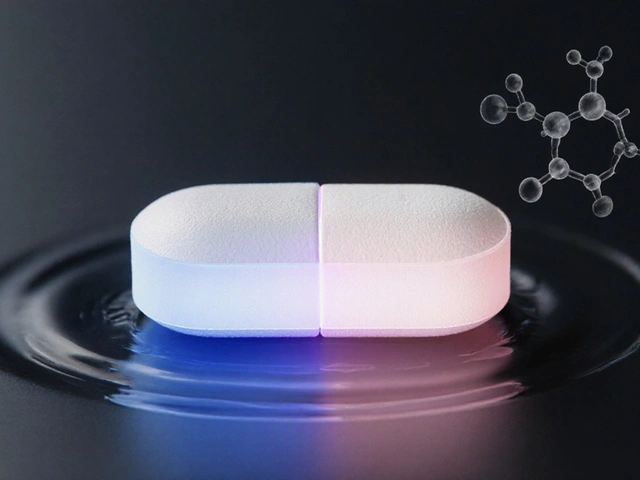Hearing aids are essential devices for many people, enhancing their ability to communicate and experience the sounds of the world around them. To keep these tiny marvels functioning well, it’s important to know how to care for them properly. Here's a guide to help you maximize the lifespan of your hearing aids through effective maintenance and care.
- Cleaning and Maintenance
- Proper Handling and Storage
- Troubleshooting Issues
- Best Practices for Daily Use
Cleaning and Maintenance
Keeping your hearing aids clean is crucial to ensure they function correctly and last longer. These small devices sit in or around your ear, where they can easily accumulate earwax, sweat, and other debris, potentially affecting their performance. Regular cleaning is essential to prevent these issues and maintain the clarity of sound. Here are some tips to guide you through the process.
First and foremost, it’s a good idea to establish a daily cleaning routine. At the end of each day, gently wipe your hearing aids with a soft, dry cloth. This helps remove any moisture or oils from your skin. For a deeper clean, use a small brush designed for hearing aids to carefully remove any wax or debris from the microphone and speaker ports. Avoid using liquids like household cleaners or water, as they can damage the delicate electronics inside.
One useful tool to have is a wax pick or loop. This can help you dislodge any stubborn wax buildup that brushing alone might not remove. However, be gentle to avoid causing damage. If your hearing aids have wax guards, these should be checked and replaced regularly, as a blocked wax guard can significantly impair sound quality. Your hearing aid manual or audiologist can provide guidance on how often to change these parts.
"Consistent cleaning and maintenance are key to ensuring your hearing aids provide the best sound quality and longest lifespan possible," says Dr. Emily Fisher, a leading audiologist.
Another important aspect of hearing aid maintenance is ensuring they stay dry. Humidity and moisture can be particularly damaging. Many hearing aid users benefit from using a dehumidifier designed specifically for hearing aids. These devices remove humidity and can prevent moisture build-up inside the aids, which is especially helpful in humid climates or for those who sweat a lot. Simply place your hearing aids in the dehumidifier overnight to keep them dry and in optimal condition.
Every few months, it’s recommended to schedule a professional cleaning with your audiologist. They have the tools and expertise to perform a deep, thorough clean of your hearing aids. They can also check for any signs of wear or potential issues that might need addressing. It’s a good opportunity to ensure that your hearing aids are still properly calibrated for your hearing needs.
In summary, incorporating a regular cleaning routine, using the right tools, and seeking professional help can greatly extend the lifespan of your hearing aids. By taking these simple steps, you can ensure your devices continue to work effectively, allowing you to enjoy clear and uninterrupted hearing. Remember, a little daily care goes a long way in maintaining the functionality of your hearing aids.

Proper Handling and Storage
How you handle and store your hearing aids plays a crucial role in extending their lifespan. These small yet sophisticated devices require careful handling to avoid damage. Always hold them by their main body rather than delicate microphones or receivers to ensure they remain in optimal condition. When inserting or removing them, do so over a soft surface like a towel or blanket. This minimizes the risk of breaking the devices if they are accidentally dropped.
Another important aspect of proper handling is to keep your hands clean and dry. Moisture, oils, and dirt from your hands can easily transfer to the hearing aids, potentially causing issues. Wash your hands thoroughly before touching or adjusting your hearing aids. Avoid using lotions or creams on your hands before handling the devices, as these substances can clog microphones and other tiny parts of the hearing aids.
Storage is just as crucial. When not in use, store your hearing aids in a dedicated, hard protective case. This helps shield them from physical damage and protects them from environmental hazards like dust and moisture. Keep them in a cool, dry place, away from direct sunlight and extreme temperatures which can cause harm.
In addition to routine storage, consider using a dehumidifier designed for hearing aids. Hearing aids are susceptible to moisture, which can lead to malfunctions. A dehumidifier helps wick away daily accrued moisture, keeping the electronics inside the device dry and functional. It's an inexpensive investment that can save you from costly repairs down the line.
Always be mindful of where you store your hearing aids when not in use. Keep them out of reach of children and pets to prevent accidental damage. If you have young children, teaching them about the importance and cost of hearing aids can also help instill a sense of responsibility.
"Protecting your hearing aids from moisture is vital," notes Dr. Linda Booth, an audiologist with over two decades of experience. "Utilizing a dehumidifier can significantly reduce the need for repairs."
Traveling with hearing aids requires extra precautions. Use a sturdy case and pack them in your carry-on luggage to prevent them from being tossed around. Bring spare batteries and any necessary cleaning tools or accessories so you're always prepared.

Troubleshooting Issues
Encountering problems with your hearing aids can be frustrating, but many common issues have simple solutions. It's important to inspect your devices regularly and address any minor problems before they escalate. Here are some troubleshooting tips to help you get your hearing aids back on track.
If you're experiencing no sound or weak sound from your hearing aids, start by checking the batteries. Ensure they are correctly inserted and that they have enough charge. Battery contacts need to be clean and free of corrosion to function properly. Replacing the batteries or charging them fully can sometimes resolve the issue.
Another common problem is feedback or a whistling sound. This can often be fixed by adjusting the fit of your hearing aid. Make sure it is seated properly in your ear. Earwax buildup can also cause feedback, so regular cleaning of both your ears and the device is essential. If feedback persists, consult your audiologist as it might indicate an issue with the device.
Distorted or unclear sound can be due to moisture. Hearing aids are sensitive to moisture, so it's essential to keep them dry. Use a hearing aid dehumidifier or a dry box to store your devices overnight. If your hearing aids do get wet, don't try to dry them with a hairdryer; instead, let them air dry and use a dehumidifier.
If your hearing aid suddenly stops working, check for any visible damage or obstructions like wax or debris. Clean the device using the tools provided by your hearing aid manufacturer. If there seems to be no damage and it still doesn’t work, it might be time for professional maintenance.
Volume control issues can sometimes be resolved by resetting the hearing aid or reprogramming it using the accompanying software or app. Ensure that the settings on your device match your hearing needs, and adjust as necessary. If you’re still having trouble, consulting your audiologist is advisable.
According to a study by the National Institutes of Health, “Regular maintenance and proper troubleshooting can extend the life of hearing aids by up to 30%.”
Additional Tips
Always refer to your hearing aid manual for specific troubleshooting guidelines. Each model can have unique features and solutions. Networking with other hearing aid users can also provide helpful insights and tips. If you frequently encounter problems, keeping a log can help an audiologist diagnose any recurring issues more effectively.

Best Practices for Daily Use
Ensuring your hearing aids function at their best requires a consistent daily routine. After all, these devices are not only significant financial investments but also critical to your quality of life. Below are some essential daily practices to help maintain your hearing aids for the long haul.
Begin each day by checking your hearing aids for any signs of wear and tear. Inspect the battery levels to make sure they are ready for the day ahead. Low batteries can cause your hearing aids to work improperly, sometimes distorting sound or making it too quiet. It’s a good idea to keep spare batteries with you, especially if you’re going out.
Clean your hearing aids before bed each night. This removes any earwax or dirt buildup that could affect their performance. Use a soft, dry cloth to wipe them down, and use the specialized tools that often come with hearing aid kits for more thorough cleaning. However, remember never to use water or cleaning solvents, as these can damage the internal components.
Proper storage is another vital aspect of daily care. When not in use, keep your hearing aids in a dry, safe place. Some people prefer to use a dehumidifier case, which not only stores the devices safely but also removes any moisture that may have accumulated during the day.
Avoid exposing your hearing aids to extreme temperatures. Whether it's the freezing cold of winter or the sweltering heat of summer, these conditions can damage sensitive electronic components. The rule of thumb is: if it's uncomfortable for you, it's probably not good for your hearing aids either.
While you’re at it, make sure to handle your hearing aids with clean hands. Oils, lotions, and other residues from your fingers can harm these delicate devices over time. Always wash your hands before putting in or taking out your hearing aids.
Regularly check the microphones and speakers of your hearing aids. Dust or debris can muffle their sound, reducing effectiveness. Using a small brush or the tools that come with your hearing aids can help keep these parts clear.
Incorporating these daily habits will not only extend the lifespan of your hearing aids but also improve their performance. It’s all about consistency. By investing a few minutes each day in taking care of your hearing aids, you can ensure they serve you well for years to come.
“Proper maintenance of hearing aids can extend their lifespan significantly, ensuring they provide the best possible assistance to the user. This daily care involves regular cleaning, appropriate storage, and timely inspections,” says Dr. Sarah Thompson, Audiologist at Manchester Hearing Clinic.
Remember: consistency is key. The more diligent you are with these daily practices, the better your hearing aids will perform, making sure you don’t miss out on the sounds of life.









Comments (8)
Michael Dennis
September 20, 2024 AT 21:28 PMWhile the advice is sound, the article redundantly repeats basic steps.
Blair Robertshaw
September 20, 2024 AT 21:45 PMHonestly, this guide is a bit of a waste of time – it swears by dehumiidifiers that most users never even own. The writer pretends we’re all audiology geeks, but most of us just want a simple clean routine. They could’ve cut the fluff and gotten straight to the point, like “dry them, change batteries, don’t drown ‘em”. Also, the article’s link to a 200‑page pdf is overkill for a quick tip page. It feels like they’re trying too hard to sound “expert”, which backfires.
Alec Maley
September 20, 2024 AT 22:01 PMHey, great rundown! It’s awesome to see such clear steps that actually make caring for hearing aids feel doable. Keeping the routine simple and using a dehumidifier can really save you from costly repairs later, and that motivation to check batteries each morning is pure gold. Remember, a little habit goes a long way, so stick with it and you’ll notice the difference in sound quality. Keep it up, and thanks for sharing this practical guide.
Navjot Ghotra
September 20, 2024 AT 22:18 PMLooks fine but could use less wordy sections and more bullet points
Claus Rossler
September 20, 2024 AT 22:35 PMOne might argue that the purported “fluff” is, in fact, the indispensable context that elevates mere procedural instructions to a comprehensive educational experience. While the critic decries the mention of dehumidifiers, the truth remains that moisture is the silent adversary of electronic integrity, and omission would be a disservice to the discerning practitioner. Moreover, the inclusion of scholarly references, however voluminous, serves to anchor the advice in empirical research, a practice worthy of commendation rather than contempt. In short, depth should not be mistaken for pretension.
chris mattox
September 20, 2024 AT 22:51 PMAbsolutely, the depth adds a vibrant palette to what could otherwise be a drab checklist. Think of it like seasoning in a stew – a pinch of science makes the flavor richer and the outcome more satisfying. Embracing those detailed references not only empowers users with knowledge but also builds a community of informed caretakers. Let’s keep the conversation lively and inclusive, sharing tips and personal anecdotes so everyone feels welcomed in this journey toward better hearing health.
Jackson Whicker
September 20, 2024 AT 23:08 PMIn the grand theatre of auditory existence, each meticulous brushstroke of maintenance is a tribute to the quintessential human yearning for sound. To neglect the seemingly minute rituals is to consort with oblivion, allowing silence to erode the fragile symphony of life. Thus, the discourse transcends mere practicality; it becomes an ode to perseverance, a manifesto that the diligent stewardship of one’s hearing aid is, indubitably, a reflection of one’s resolve to confront the abyss of silence with vigor and eloquence.
Audrin De Waal
September 20, 2024 AT 23:25 PMYo, while you’re tossing formal jargon around, remember that real folks in South Africa have been tweaking their own gear long before anyone wrote a “guide”. We know that a simple wipe and a dry box can keep the devices humming, no need for all that fancy talk. It’s about common sense, not academic fluff – just like we say, protect your hearing like you protect your homeland.